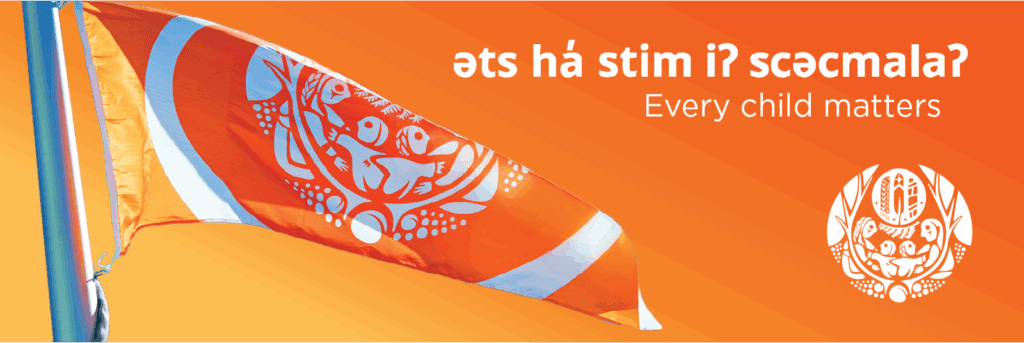Each year on 30 September, Canadians mark the National Day for Truth and Reconciliation. The day is both solemn and hopeful: it honours the children who never returned from residential schools and the Survivors whose resilience continues to inspire change.
Orange Shirt Day, which shares this date, begins with Phyllis Webstad of the Stswecem’c Xgat’tem First Nation and the story of her first day of residential school:
Phyllis’ Story In Her Own Words
“I went to the Mission for one school year in 1973/1974. I had just turned 6 years old. I lived with my grandmother on the Dog Creek reserve. We never had very much money, but somehow my granny managed to buy me a new outfit to go to the Mission school. I remember going to Robinson’s store and picking out a shiny orange shirt. It had string laced up in front, and was so bright and exciting – just like I felt to be going to school!
When I got to the Mission, they stripped me, and took away my clothes, including the orange shirt! I never wore it again. I didn’t understand why they wouldn’t give it back to me, it was mine! The color orange has always reminded me of that and how my feelings didn’t matter, how no one cared and how I felt like I was worth nothing. All of us little children were crying and no one cared.
I was 13 years old and in grade 8 when my son Jeremy was born. Because my grandmother and mother both attended residential school for 10 years each, I never knew what a parent was supposed to be like. With the help of my aunt, Agness Jack, I was able to raise my son and have him know me as his mother.
I went to a treatment centre for healing when I was 27 and have been on this healing journey since then. I finally get it, that the feeling of worthlessness and insignificance, ingrained in me from my first day at the mission, affected the way I lived my life for many years. Even now, when I know nothing could be further than the truth, I still sometimes feel that I don’t matter. Even with all the work I’ve done!
I am honored to be able to tell my story so that others may benefit and understand, and maybe other survivors will feel comfortable enough to share their stories.”
Phyllis’ orange shirt has become a lasting symbol of the losses experienced by thousands of students and their families: the loss of family, language, culture, freedom, and self-worth. Wearing orange today is an act of remembrance, resistance, and commitment to a future where every child is valued.
The National Day for Truth and Reconciliation, created in 2021 through Call to Action #80 of the Truth and Reconciliation Commission, calls on Canadians to honour Survivors, families, and communities, ensuring that public commemoration of the history and legacy of residential schools remains a vital part of the reconciliation process.
At the ORL, reconciliation means making space for Indigenous voices and stories year-round. Our branches feature reading lists, displays, and digital resources that highlight First Nations, Inuit, and Métis perspectives—from memoirs and histories to children’s books, films, poetry, and fiction. We invite you to explore the curated reading lists below as a starting point for learning and reflection.
syilx Okanagan Children’s Books
syilx Okanagan Reads
If you or someone you know needs support, former residential school students can call the 24-Hour National Crisis Line at 1-866-925-4419 for crisis referral services. The Hope for Wellness Help Line is also available 24/7 at 1-855-242-3310 or online.
Take part in the National Day for Truth and Reconciliation by wearing orange, learning more about the legacy of residential schools, supporting Indigenous-led organizations, and sharing conversations. Each of these actions helps affirm our collective responsibility to truth, healing, and reconciliation.




